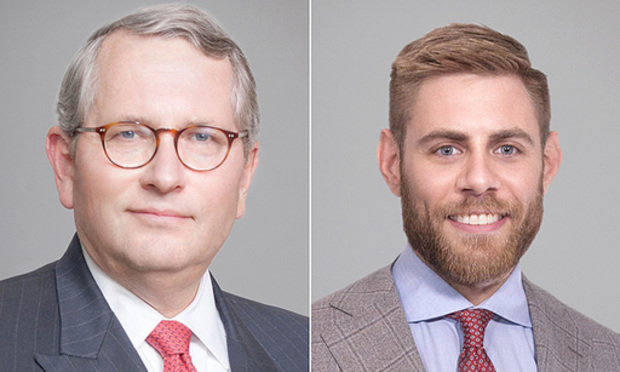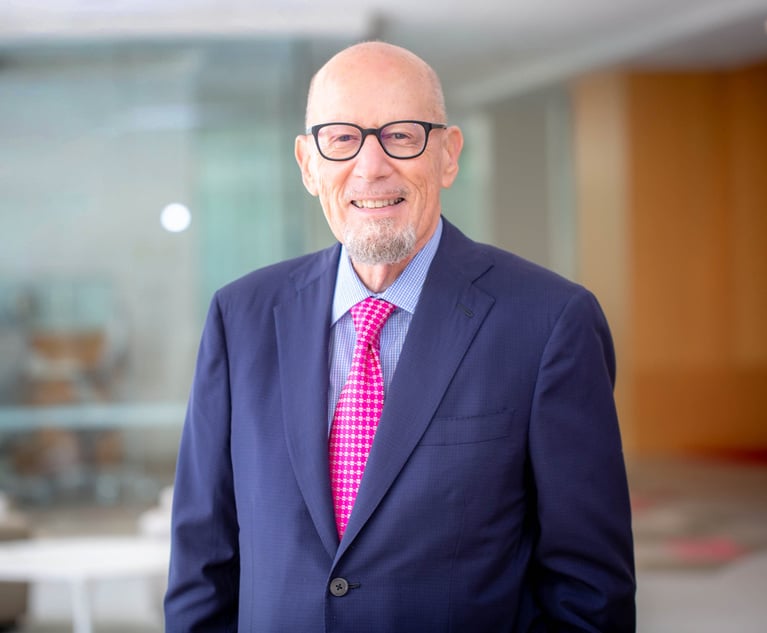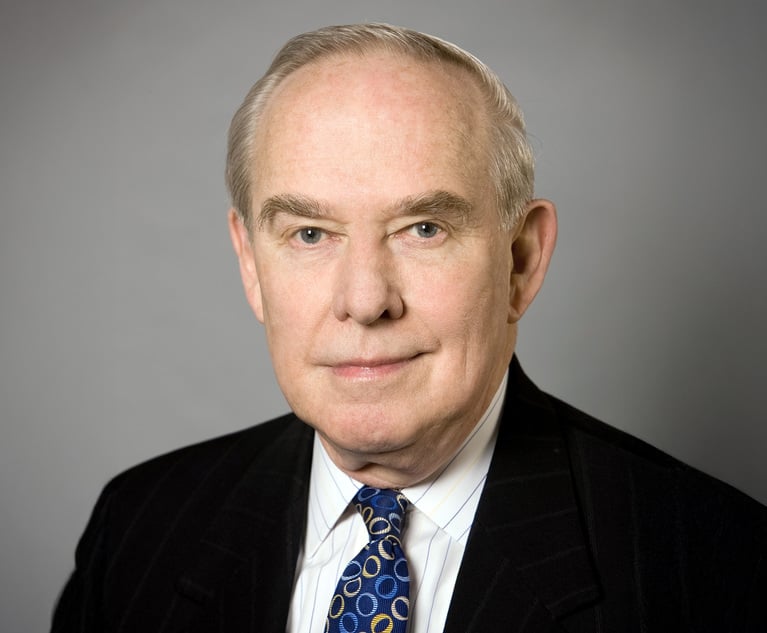New Antitrust Division Chief Prioritizes Regulation of Standard Setting Organizations
As we discussed in our May 2017 article, the current head of the DOJ's Antitrust Division, Makan Delrahim, brings considerable intellectual property experience to the division. Delrahim started his legal career at the Office of the U.S. Trade Representative as deputy director for intellectual property rights.
December 01, 2017 at 04:34 PM
8 minute read

As we discussed in our May 2017 article, the current head of the DOJ's Antitrust Division, Makan Delrahim, brings considerable intellectual property experience to the division. Delrahim started his legal career at the Office of the U.S. Trade Representative as deputy director for intellectual property rights. He later served on the Intellectual Property Task Force while serving a stint at the DOJ in the early 2000s. Then-acting Antitrust Division Chief R. Hewitt Pate referred to Delrahim as a “patent lawyer.” Therefore, it is not surprising that, in a Nov. 10 maiden speech at the University of California's Transactional Law and Business Conference, Delrahim chose to discuss antitrust violations in IP licensing, specifically urging federal and state antitrust enforcement agencies to prioritize review of standard setting organizations (SSOs).
Delrahim's Remarks on Anticompetitive SSO Licensing
SSOs are private associations that, among other things, develop technical, quality and safety standards and that sometimes issue certifications of compliance for products that meet those standards. They usually offer membership to industry participants, from which they obtain funding, and are routinely managed by employees of those organizations. One example of an SSO is the National Fire Protection Association (NFPA). As the Supreme Court explained in Allied Tube & Conduit v. Indian Head, a seminal antitrust case applying the Sherman Act to SSOs, the NFPA is a “private, voluntary organization” of “individual and group members representing industry, labor, academia, insurers, organized medicine, firefighters, and government” that “publishes product standards and codes related to fire protection.” The standards set by the NFPA are “routinely adopted” by “a substantial number of state and local governments.”
In his recent speech, Delrahim examined the relationship between patent holders–which he called technology “innovators”–and SSOs–which he called “technology implementers.” He identified two potential antitrust issues arising from interaction between these two groups: the “hold-up problem” and the “hold-out problem.” According to Delrahim, the hold-up problem occurs when patent holders leverage their exclusive rights to a patented design to demand favorable royalty terms from SSO members, the idea being that, once an SSO has adopted its standard, SSO members must either agree to patent holders' demands or risk being effectively excluded from the market. Conversely, the hold-out problem occurs when SSOs leverage their industry clout by “threatening to under-invest in the implementation of a standard [utilizing the patented design] or threatening not to take a license at all, until its royalty demands are met.”
According to Delrahim, the “hold-up and the hold-out problems are not symmetric,” and the “collective hold-out problem [represents] a more serious impediment to innovation.” This is because patent holders must “make an investment before they know whether that investment will ever pay off” while “at least some of [SSOs'] investments occur after royalty rates for new technology could have been determined.” Therefore, he urged antitrust enforcers nationwide to “carefully examine and recognize the risk that SSO members might engage in a form of buyer's cartel, what economists call a monopsony effect” by collectively agreeing when and on what terms to adopt a standard or continue supporting an incumbent one.
While Delrahim spent a great deal of his speech unpacking his thoughtful theory of asymmetry between the hold-up and hold-out problems, the upshot of his remarks is that the new Assistant Attorney General for the Antitrust Division believes that SSOs should be more rigorously scrutinized, especially when it comes to IP licensing. As Delrahim warned (quoting the Supreme Court in American Society of Mechanical Engineers v. Hydrolevel: “SSOs 'can be rife with opportunities for anticompetitive activity.' When competitors come together, there is always a risk that they will engage in naked cartel-like behavior, such as fixing downstream prices or boycotting a new entrant.” Delrahim “therefore urge[d] antitrust enforcers … to take a fresh look at concerted actions within SSOs that cause competitive harm to the dynamic innovation process,” by using all the tools in their prosecutorial toolboxes. Since antitrust violations are a federal predicate crime, that includes possible wiretaps.
Antitrust Enforcement Against SSOs
The DOJ can regulate SSOs civilly and criminally under Sections 1 and 2 of the Sherman Act. Section 1 of the Sherman Act prohibits contracts, combinations and conspiracies in restraint of trade while Section 2 of the Sherman Act prohibits monopolization, attempted monopolization, and conspiracy to monopolize trade or commerce. Section 5 of the Federal Trade Commission Act is broader than the Sherman Act and gives the FTC substantial authority to prosecute civilly “unfair methods of competition in or affecting commerce, and unfair or deceptive acts or practices in or affecting commerce.”
In Allied Tube & Conduit, the Supreme Court ruled that SSO standard setting is not immune from the antitrust laws–even when federal, state, or local government entities ratify standards set by SSOs. By contrast, SSOs are generally entitled to immunity under the Noerr-Pennington Doctrine when their activities relate to direct petitioning of government entities, unless that petitioning is a sham to cover what is nothing more than a baseless attempt to interfere with business rivals for anticompetitive purposes. For example, SSOs would be immune to the extent they legitimately coordinate sponsorship of a legislative bill or bring a lawsuit with merit against a member who falsely advertises that its product complies with an SSO standard.
Further, courts generally apply the necessarily fact and expert extensive rule of reason to SSO industry standards, except to the extent the conduct in question amounts to naked cartel behavior–e.g., price fixing, group boycotts, and market allocation. The rule of reason requires courts to balance the procompetitive and anticompetitive effects of the standard or certification at issue to determine whether it unreasonably restrains trade in the relevant market. While standards may have procompetitive aspects, they can also retard innovation. And liability can be extensive. SSOs, participating member organizations, and member organization employees serving SSOs in a managerial capacity can all be held liable. Violations carry stiff fines and can lead to disgorgement of ill-gotten proceeds under the Lanham Act (not to mention criminal charges). In addition, private antitrust lawsuits frequently accompany or follow DOJ enforcement actions, exposing SSOs and their members to automatic treble damages, as well as attorneys' fees and costs incurred in successfully prosecuting those claims.
Precautions to Avoid Liability
SSOs and their members can and should (with Delrahim now at the helm) take a number of steps to mitigate the risk of antitrust liability. First, they should implement regulations governing the processes by which they set new standards (or elect to retain old ones) and issue certifications of compliance with those standards. Second, those regulations should be based on objective criteria that remove discretion from the equation, to avoid the appearance that SSOs and their member organizations are picking favorites among competitors. Third, the objective criteria should be reasonably related to legitimate SSO purposes and be narrowly tailored to address those objectives. Fourth, the process of adopting standards and issuing certifications should be transparent (although Delrahim noted in his speech that “the old notion that openness alone is sufficient to guard against cartel-like behavior in SSOs may be outdated, given the evolution of SSOs beyond strictly objective technical endeavors”). Fifth, standards should be voluntary such that member organizations do not feel obligated to adopt them to avoid SSO blowback. Sixth, membership in SSOs should be open to any organization that wishes to join and meets the criteria for admission.
Further, SSOs and their members should take care to avoid sharing confidential business information. This includes research and development, pricing and pricing methods, profit margins, output levels, and geographic sales territory. The sharing of this information will certainly draw the attention of regulators and, under the Supreme Court's liberal pleading standard, can open the door to costly, time-consuming, and disruptive discovery. These precautions are especially important where an SSO's members collectively comprise a substantial share of the relevant market.
Most importantly, SSOs and their members should take to heart and view Delrahim's comments as presenting an opportunity to engage in a probably long overdue review update of their antitrust policies and to re-evaluate their training protocol. Indeed, Delrahim expressly “urge[d] SSOs to be proactive in evaluating their own rules, both at the inception of the organization, and routinely thereafter. In fact,” he continued, “SSOs would be well advised to implement and maintain internal antitrust compliance programs and regularly assess whether their rules, or application of those rules, are or may become anticompetitive.” Therefore, not doing so, will have penny wise and pound foolish consequences now, more than ever. Stay tuned.
Carl W. Hittinger is a senior partner in Baker & Hostetler's antitrust group and the litigation group coordinator for the firm's Philadelphia office. He concentrates his practice on complex commercial and civil rights trial and appellate litigation, with a particular emphasis on antitrust and unfair competition matters. He can be reached at 215-564-2898 or [email protected].
Tyson Y. Herrold is an associate in the firm's Philadelphia office in its litigation group. His practice focuses on complex commercial and antitrust litigation matters. His experience also includes judicial clerkships for U.S. District Judge Malachy E. Mannion of the Middle District of Pennsylvania, Judge C. Darnell Jones II of the Eastern District of Pennsylvania and Judge Dolores K. Sloviter of the U.S. Court of Appeals for the Third Circuit. He can be reached at 215-568-3439 or [email protected].
This content has been archived. It is available through our partners, LexisNexis® and Bloomberg Law.
To view this content, please continue to their sites.
Not a Lexis Subscriber?
Subscribe Now
Not a Bloomberg Law Subscriber?
Subscribe Now
NOT FOR REPRINT
© 2025 ALM Global, LLC, All Rights Reserved. Request academic re-use from www.copyright.com. All other uses, submit a request to [email protected]. For more information visit Asset & Logo Licensing.
You Might Like
View All
Cozen O'Connor's Bernard Nash Pioneered the Modern State AGs Practice. Now He's Hanging Up His Boots
6 minute read
What to Know About the New 'Overlapping Directorship' Antitrust Development
4 minute read
Bondi and Big Tech: What Trump's Choice for US AG Could Mean for Antitrust Enforcement
7 minute readTrending Stories
- 1Recent Controversial Decision and Insurance Law May Mitigate Exposure for Companies Subject to False Claims Act Lawsuits
- 2Visa Revocation and Removal: Can the New Administration Remove Foreign Nationals for Past Advocacy?
- 3Your Communications Are Not Secure! What Legal Professionals Need to Know
- 4Legal Leaders Need To Create A High-Trust Culture
- 5There's a New Chief Judge in Town: Meet the Top Miami Jurist
Who Got The Work
J. Brugh Lower of Gibbons has entered an appearance for industrial equipment supplier Devco Corporation in a pending trademark infringement lawsuit. The suit, accusing the defendant of selling knock-off Graco products, was filed Dec. 18 in New Jersey District Court by Rivkin Radler on behalf of Graco Inc. and Graco Minnesota. The case, assigned to U.S. District Judge Zahid N. Quraishi, is 3:24-cv-11294, Graco Inc. et al v. Devco Corporation.
Who Got The Work
Rebecca Maller-Stein and Kent A. Yalowitz of Arnold & Porter Kaye Scholer have entered their appearances for Hanaco Venture Capital and its executives, Lior Prosor and David Frankel, in a pending securities lawsuit. The action, filed on Dec. 24 in New York Southern District Court by Zell, Aron & Co. on behalf of Goldeneye Advisors, accuses the defendants of negligently and fraudulently managing the plaintiff's $1 million investment. The case, assigned to U.S. District Judge Vernon S. Broderick, is 1:24-cv-09918, Goldeneye Advisors, LLC v. Hanaco Venture Capital, Ltd. et al.
Who Got The Work
Attorneys from A&O Shearman has stepped in as defense counsel for Toronto-Dominion Bank and other defendants in a pending securities class action. The suit, filed Dec. 11 in New York Southern District Court by Bleichmar Fonti & Auld, accuses the defendants of concealing the bank's 'pervasive' deficiencies in regards to its compliance with the Bank Secrecy Act and the quality of its anti-money laundering controls. The case, assigned to U.S. District Judge Arun Subramanian, is 1:24-cv-09445, Gonzalez v. The Toronto-Dominion Bank et al.
Who Got The Work
Crown Castle International, a Pennsylvania company providing shared communications infrastructure, has turned to Luke D. Wolf of Gordon Rees Scully Mansukhani to fend off a pending breach-of-contract lawsuit. The court action, filed Nov. 25 in Michigan Eastern District Court by Hooper Hathaway PC on behalf of The Town Residences LLC, accuses Crown Castle of failing to transfer approximately $30,000 in utility payments from T-Mobile in breach of a roof-top lease and assignment agreement. The case, assigned to U.S. District Judge Susan K. Declercq, is 2:24-cv-13131, The Town Residences LLC v. T-Mobile US, Inc. et al.
Who Got The Work
Wilfred P. Coronato and Daniel M. Schwartz of McCarter & English have stepped in as defense counsel to Electrolux Home Products Inc. in a pending product liability lawsuit. The court action, filed Nov. 26 in New York Eastern District Court by Poulos Lopiccolo PC and Nagel Rice LLP on behalf of David Stern, alleges that the defendant's refrigerators’ drawers and shelving repeatedly break and fall apart within months after purchase. The case, assigned to U.S. District Judge Joan M. Azrack, is 2:24-cv-08204, Stern v. Electrolux Home Products, Inc.
Featured Firms
Law Offices of Gary Martin Hays & Associates, P.C.
(470) 294-1674
Law Offices of Mark E. Salomone
(857) 444-6468
Smith & Hassler
(713) 739-1250






